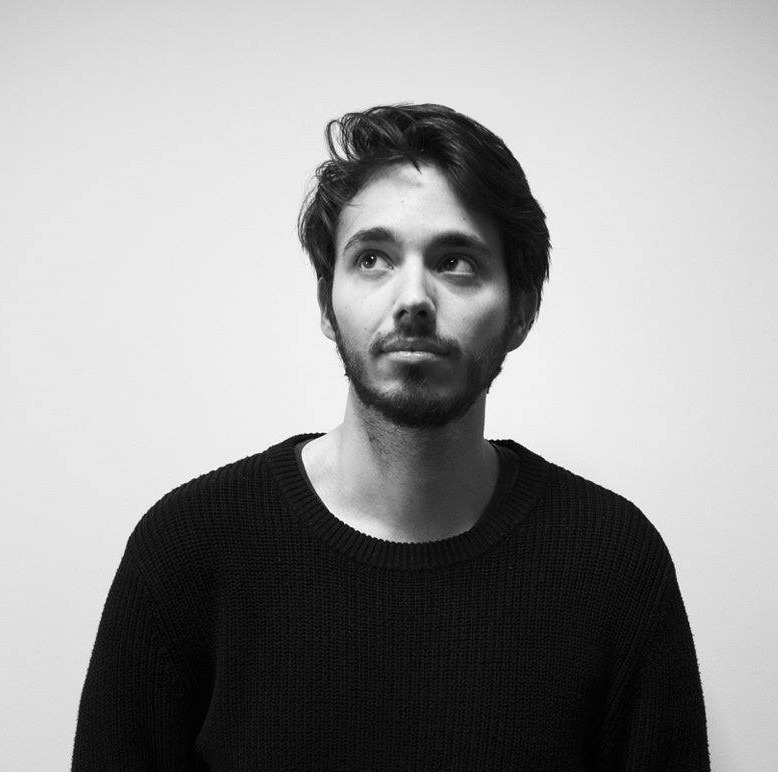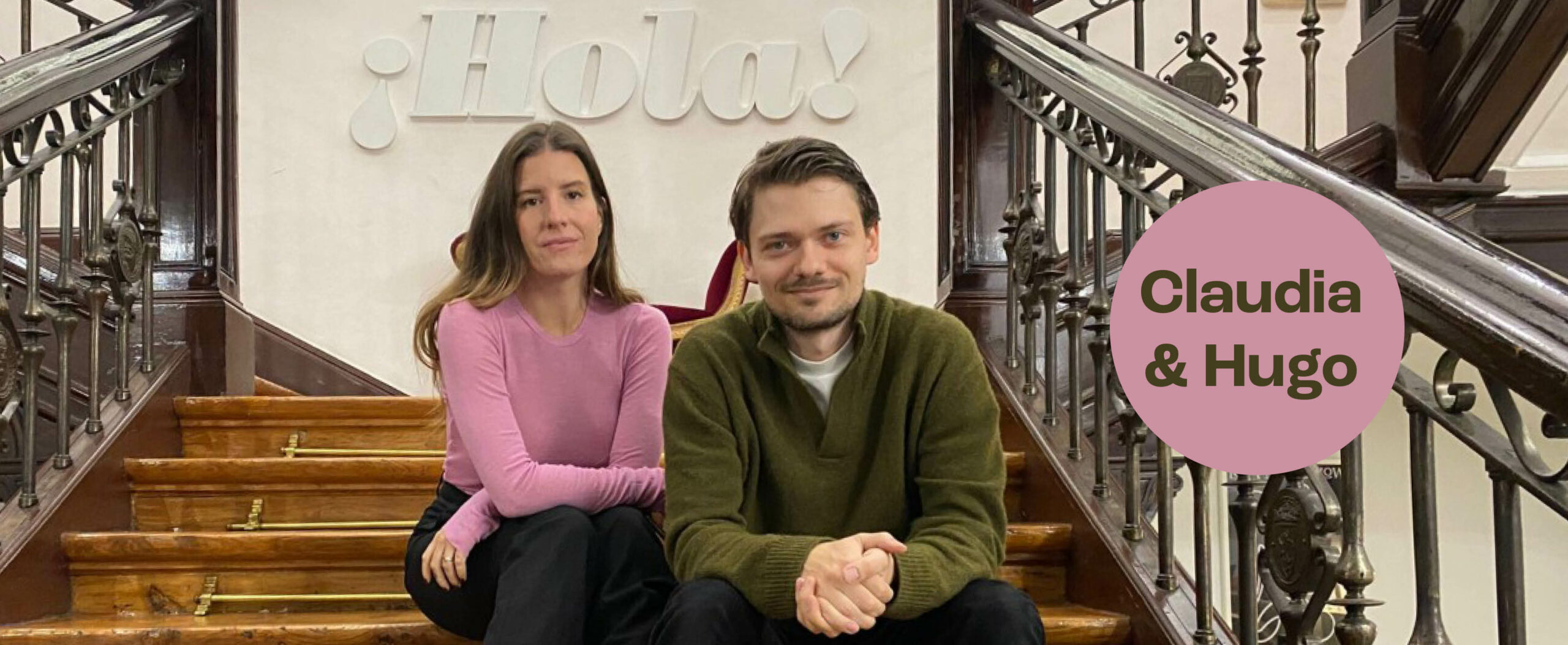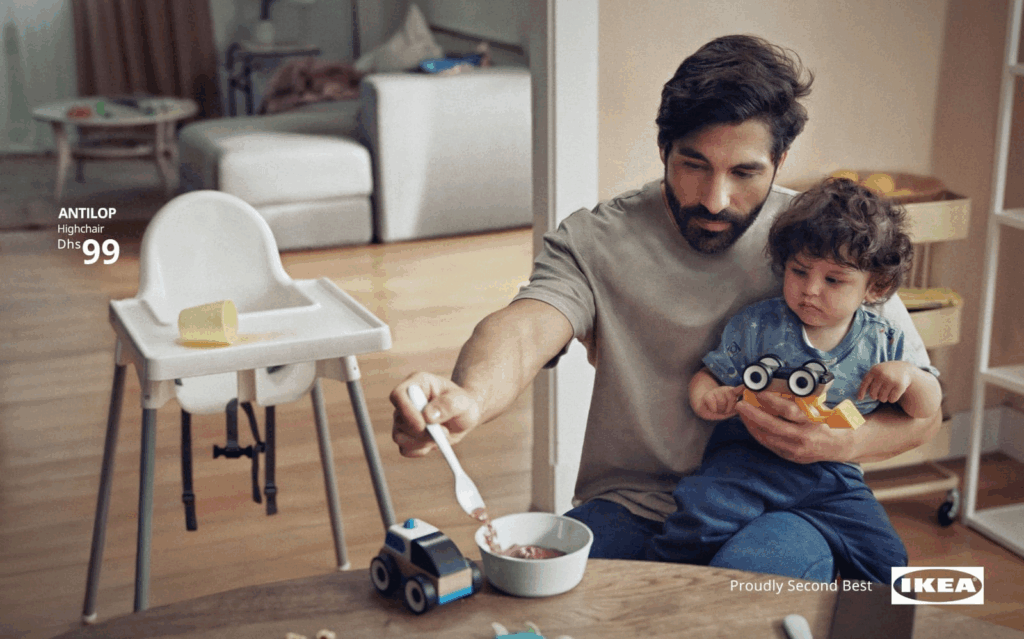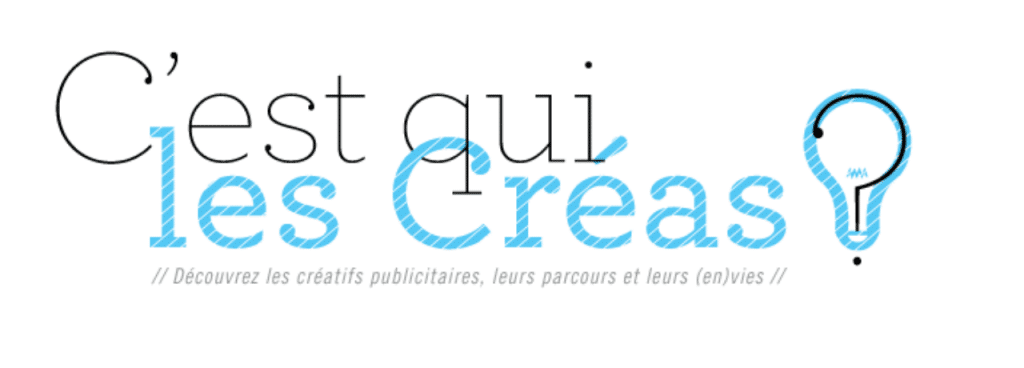ENGLISH
It’s often said that the golden age of advertising is behind us, this may be true in some respects—but not in others. France is increasingly recognized on the international stage, consistently ranking among the top five countries awarded at global advertising festivals.
As a result, French advertising is no longer only made by the French. More and more foreign talent are trying their luck in Paris. In agencies, they’re sometimes referred to as “internationals.”
But who exactly are these internationals? Meet Hugo and Claudia. She’s from Spain, he’s from Sweden. They met in Berlin and decided to move to Paris to hack the biggest tech brand in the world.
FRANÇAIS
Si on dit souvent que l’âge d’or de la pub est derrière nous, ce qui est vrai sur certains points ne l’est pas forcément sur d’autres. La France est de plus en plus reconnue à l’étranger. Le pays étant régulièrement classé dans le top 5 des pays les plus récompensés dans les festivals internationaux.
Résultat : la publicité française n’est plus seulement faite pas des Français. De plus en plus de talents étrangers tentent leur chance à Paris. Ceux qu’on appelle parfois en agence les « internationaux ».
Mais c’est qui les internationaux ? ici, c’est Hugo et Claudia. Elle vient d’Espagne, lui de Suède. Ils se sont rencontrés à Berlin et ils ont décidé de venir à Paris pour hacker la plus grande marque de tech du monde.

This series of interviews is orchestrated by Joseph Rozier.

Hi ! Can you tell us more about you?
Claudia started working on the client side until she realised being on the side of the creative was more fun. So she quit her job and hometown and settled in Berlin to do Miami Ad School where she met Hugo by chance, since there’s a 5 years gap between them.
Hugo has done a year in Santa Barbara were he discovered Madmen and realised he wanted to be part od the industry.
Hugo was the only AD in class but turns out Claudia was the one to claim him. We did our first internship in NYC working for clients like Oreo and HBO, then went to McCann London, and split our paths when Claudia wanted to go to Sao Paulo and Hugo remained in Berlin. Those three months of separation made it clear they should make it official and become a team with one portfolio.
We landed our first job in Publicis Milan “Le Pub” to work for Heineken and Diesel which was an amazing start to our career. And it led us meeting Gaëtan Du Peloux (CCO-CEO Marcel) at LIA where we clicked right away. We’d always been fond of the work at Marcel, we loved “Inglorious fruits and vegetables” since Miami Ad School.
When we heard there was a spot open we didn’t hesitate to take it. We’d also been doing a lot of traditional advertising with big budgets for big brands and we thought the more pirate attitude of Marcel was a great next step in our careers. It was a smooth landing until the pandemic hit. We spent it in a 50 sq meter apartment looking inside the building.
The people at the agency were very welcoming, and all willing to speak english during meetings. The agency feels like a big family who’s mostly championing David in the fight with a Goliath in a fun and surprising way. We’ve learned a lot in our years at Marcel and Paris having lived in so many places has been by far the hardest place to say “hasta la vista” to.
Can you share some campaigns you’ve worked on here?
The campaign we’re most proud of is Hackmarket for a refurbished tech brand called Backmarket. It is exactly the kind of campaign we were dreaming to make when we went to Marcel. Low budget, brave, risky, fun…and it gave us the opportunity of spending a week in Cannes celebrating the win with all the team who fought so hard to make it happen. It changed our career but specially producing it gave us memories we’ll never forget.
Salut Claudia, peux-tu nous raconter un peu votre parcours avec Hugo ?
J’ai commencé ma carrière côté client, jusqu’au jour où j’ai réalisé que le côté créatif était bien plus amusant. J’ai donc quitté mon emploi et ma ville natale pour m’installer à Berlin et étudier à la Miami Ad School, où j’ai rencontré Hugo.
Hugo, lui, a passé une année à Santa Barbara, où il a découvert Mad Men et compris qu’il voulait faire de la pub. Il était le seul directeur artistique de sa promotion, mais j’ai réussi à lui mettre le grapin dessus. Nous avons fait notre premier stage à New York, en travaillant pour des clients comme Oreo et HBO. Puis nous sommes partis chez McCann à Londres. Ensuite, nos chemins se sont séparés… je suis partie à São Paulo tandis que Hugo est resté à Berlin. Ces trois mois de séparation nous ont fait comprendre qu’il fallait officialiser notre duo et constituer un seul et même portfolio.
Nous avons décroché notre premier poste chez Publicis Milan, chez Le Pub, pour travailler sur Heineken et Diesel — un excellent départ pour notre carrière. C’est d’ailleurs là que nous avons rencontré Gaëtan Du Peloux (CCO & CEO de Marcel) lors des LIA. Le courant est tout de suite passé ! Nous avons toujours admiré le travail de Marcel, notamment la campagne Les Fruits & Légumes Moches, que nous aimions déjà à l’époque de la Miami Ad School. Quand nous avons appris qu’un poste s’ouvrait là-bas, nous n’avons pas hésité une seconde.
Après plusieurs campagnes traditionnelles avec de gros budgets pour de grandes marques, nous trouvions que l’attitude plus « pirate » de Marcel représentait la suite logique de notre parcours. L’intégration s’est faite tout en douceur… jusqu’à ce que la pandémie frappe. Nous l’avons traversée enfermés dans un appartement de 50 m², avec vue sur la cour intérieure de l’immeuble.
Chez Marcel, les gens ont été très accueillants. Tout le monde faisait l’effort de parler anglais pendant les réunions. L’agence ressemble à une grande famille qui incarne le combat de David contre Goliath — mais toujours avec humour et surprise. Nous avons énormément appris pendant nos années chez Marcel, et parmi toutes les villes où nous avons vécu, Paris est de loin celle à laquelle il a été le plus difficile de dire ‘Hasta la vista’.
On est restés en France de 2019 à 2025 avant de partir pour l’Espagne.
Sur quelles campagnes avez-vous travaillé en France ?
La campagne dont nous sommes le plus fier est Hackmarket, pour la marque de produits reconditionnés Back Market. C’est exactement le genre de projet que nous rêvions de faire en rejoignant Marcel : petit budget, audacieux, risqué, fun… Et surtout, il nous a permis de passer une semaine à Cannes pour célébrer la victoire avec toute l’équipe qui s’était battue pour la faire vivre. Cette campagne a changé notre carrière, mais surtout, sa production nous a laissé des souvenirs inoubliables.
We worked as well on a campaign for Medecins du Monde, right in the middle of the pandemic with an amazing director, Jessy Moussalem, all the cast was made of real people, and it was a pleasure to see how with such a small budget people were willing to go the extra mile to make the project the best it could be. From the music to voice over actor, to the whole production team.
Nous avons également travaillé sur une campagne pour Médecins du Monde, alors qu’on était en plein cœur de la pandémie, avec une réalisatrice incroyable : Jessy Moussalem. Tout le casting était composé de vraies personnes, et c’était un vrai plaisir de voir à quel point chacun — de la musique au comédien voix off, en passant par l’équipe de production — s’est dépassé pour tirer le meilleur du projet, malgré un petit budget.
We also discovered you can create lightnings and place them over an iconic building in Champs Elysees for a project to promote the movie “The Flash”. The whole process felt like learning chemistry and physics again and then watching the magic happen.
Nous avons aussi découvert qu’il était possible de créer des éclairs, et de les projeter sur un bâtiment emblématique des Champs-Élysées, pour promouvoir le film The Flash. Tout le processus ressemblait à un cours de chimie et de physique… avant d’assister à la magie du résultat.
While at Le Pub we worked on a fun project for Heineken’s sponsorship of the rugby world cup. We shot it in Paris, with a directing group that we really admire, Megaforce. It gave us a taste of what living in the city was, and pushed us to make it our next home.
Chez Le Pub, nous avons également travaillé sur un projet amusant autour du partenariat d’Heineken avec la Coupe du Monde de rugby. Le tournage a eu lieu à Paris, avec un collectif de réalisateurs que nous admirons beaucoup : Megaforce. Ce projet nous a donné un avant-goût de la vie parisienne, et c’est ce qui nous a décidés à en faire notre prochaine maison.
In your opinion,what are the specificities in the French advertising industry?
In France the creative outcome is very democratic, you have meetings with the whole team, including accounts and planners super early on, to discuss the creative ideas whereas in other countries that feedback comes at the end right before you present to the client. Also we discovered in France there’s a lot of super talented creatives with many years of experience who don’t want to become creative directors because they want to keep their creative freedom instead of being attached to one client.
Their passion is coming up with ideas so they don’t really care about titles as long as they can keep doing good work. Which was interesting because in an industry where you have people who are cd’s in their late 20’s it’s easy to obsess about what’s the next step instead of enjoying the reason you got into this job: ideas, ideas, ideas.
Is it more challenging to integrate oneself, as an international professional?
For sure, you don’t speak the language, you don’t have the same references, maybe you don’t even have the same humor. Plus when you arrive in a new city you want to make friends but people who are already from the city or the country have their own friendships so it’s harder to break that barrier. But that’s also exciting and the reason you move, you want to challenge yourself, see how you work outside of your comfort zone, meet new people, find new favorite places…all of these experiences give you new perspectives and stories that help when you need to concept for a brief.
Which agencies did you know in France before coming here?
Publicis Conseil, Marcel, BETC and Buzzman.
Which agencies would you recommend in Spain?
Depends on what you’re looking for but if you’re looking for a very creative small shop that feels like a big family, then Lola Mullenlowe. They’re the agency behind some amazing projects like “Clown night” for Burger King, “Find your summer” for Magnum. And recently they’ve completely revamped Axe, and done some great funny and quirky work for the brand like “Robbery” and “Funeral”. It’s hard to see real humor pushed in advertising today and they are doing that.
Quelles spécificités voyez-vous dans la pub française ?
En France, la création est très démocratique : les réunions se font très tôt avec toute l’équipe : commerciaux, planneurs, créatifs.… alors que dans d’autres pays, les retours arrivent souvent à la fin, juste avant la présentation client.
Nous avons aussi découvert qu’il existe en France de nombreux créatifs extrêmement talentueux, avec des années d’expérience, qui ne souhaitent pas devenir directeurs de création.
Ils préfèrent garder leur liberté créative plutôt que d’être attachés à un seul client. Leur passion, c’est de trouver des idées — peu leur importe le titre, tant qu’ils peuvent continuer à bien créer.
C’est intéressant, car dans une industrie où certains deviennent CD à la fin de la vingtaine, il est facile de se focaliser sur « l’étape suivante » au lieu de se souvenir de la vraie raison pour laquelle on a choisi ce métier : les idées, les idées, les idées !
Est-ce plus difficile de s’intégrer quand on vient de l’étranger ?
Bien sûr ! On ne parle pas la langue, on n’a pas les mêmes références, ni toujours le même humour. Et quand on arrive dans une nouvelle ville, on veut se faire des amis. Mais les locaux ont déjà leur cercle d’amis, donc c’est plus difficile de s’intégrer. Mais c’est aussi ce qui rend l’expérience excitante ! C’est pour ça qu’on part : pour se challenger, voir comment on fonctionne en dehors de sa zone de confort, rencontrer de nouvelles personnes, découvrir de nouveaux lieux… Toutes ces expériences offrent de nouvelles perspectives et nourrissent notre créativité.
Quelles agences connaissiez-vous en France avant d’y venir ?
Publicis Conseil, Marcel, BETC et Buzzman.
Et maintenant que vous travaillez à Madrid, quelles agences recommanderiez-vous là-bas ?
Tout dépend de ce qu’on cherche. Si vous voulez une petite agence très créative, avec une ambiance familiale, alors Lola MullenLowe est un excellent choix. C’est l’agence derrière de super projets comme Clown Night pour Burger King ou Find Your Summer pour Magnum. Ils ont récemment complètement relancé Axe, avec des campagnes drôles et décalées comme Robbery et Funeral. C’est rare aujourd’hui de voir un véritable humour assumé dans la publicité, et eux, ils le font.

Tell us a bit more about spanish and swedish advertising…
From Spain you also have some beautiful ads for the lottery called “Justino” and “Bar Antonio” that started the platform “the best price is to share it” which is an amazing strategy if you want to go down the emotional road.
Another piece of work made in Spain, we love is “Proudly second best” for Ikea from David. Such a simple and powerful insight, as a parent feels great to see the brand reflect that.
Pouvez-vous nous parler un peu de la pub espagnole et suédoise ?
En Espagne, on trouve de magnifiques publicités pour la loterie, comme Justino et Bar Antonio, qui ont lancé la plateforme « Le meilleur prix, c’est de le partager ». Une stratégie brillante pour explorer la voie de l’émotion.
Un autre travail venu d’Espagne que nous adorons, c’est Proudly Second Best d’Ikea, signé David. Un insight à la fois simple et puissant. Et en tant que parents, c’est formidable de voir une marque refléter cette réalité.

In Sweden you have Forsman & Bodenfors, Nord DDB, Ingo… and probably one of the most iconic pieces of advertising ever comes from Sweden “The epic split”. Just perfect.
“The swedish number” from Ingo is also a great example of bravery, anyone from the country could give their honest opinion about what Sweden is like. Bold.
En Suède, on retrouve Forsman & Bodenfors, Nord DDB, Ingo… et sans doute l’une des publicités les plus emblématiques de tous les temps : The Epic Split. Tout simplement parfaite.
The Swedish Number, d’Ingo également, est un autre bel exemple d’audace : n’importe quel habitant du pays pouvait répondre librement à la question « Qu’est-ce que la Suède ? ».
Une idée aussi simple qu’audacieuse.
Any advice for French creatives who want to work abroad?
Don’t try to be or think like the people of the country you move to. They hired you precisely because you’ll bring a different perspective so explore that, make it your strength. Learn to speak the language, much is said in the corridors or during meetings between jokes in the native language, you don’t want to miss out on it. Make an effort to meet people and approach people from the agency outside of work. At the end of the day when you move somewhere else you don’t only want to take great work with you but also great friendships.
What are the most followed creative festivals in your home country?
The classic international ones and then El Ojo and El Sol in Spain and Guldägget in Sweden.
https://www.elojodeiberoamerica.com/
https://elsolfestival.com/el-sol-2025/palmares-2025/
https://guldagget.se/
Is there a question that you would have liked us to ask you?
What’s the best way to approach people if you want to work in Paris. HR? Linkedin directly to creative director’s? The website? An ingenious way to drop your portfolio?
In our experience writing to people who’s work you admire directly on linkedin or via email is the best way. You’d be surprised how many people with super busy agendas will take the time to look at your portfolio and point you in the right direction.
Des conseils pour les créatifs français qui voudraient travailler à l’étranger ?
Ne cherchez pas à être, ou à penser, comme les locaux. S’ils vous ont embauchés, c’est justement pour votre regard différent : explorez cette singularité, transformez-la en force.
Apprenez la langue : beaucoup de choses se disent dans les couloirs ou pendant les réunions, entre deux blagues dans la langue locale. Ce serait dommage de passer à côté.
Faites l’effort de rencontrer des gens, de créer du lien en dehors du travail. Au fond, quand on part vivre ailleurs, on ne veut pas seulement repartir avec de beaux projets, mais aussi avec de belles amitiés.
Quels sont les festivals créatifs les plus suivis dans vos pays d’origine ?
Outre les grands festivals internationaux comme Cannes, il y a El Ojo et El Sol, en Espagne.
Et les Guldägget en Suède
Y a-t-il une question que vous auriez aimé que l’on vous pose ?
Quelle est la meilleure façon d’approcher des gens quand on veut travailler à Paris ? Faut-il passer par les RH ? Envoyer un message LinkedIn directement aux directeurs de création ? Postuler via le site web ? Ou imaginer une manière originale de déposer son portfolio ?
D’après notre expérience, le mieux est d’écrire directement aux personnes dont vous admirez le travail, sur LinkedIn ou par e-mail. Vous serez surpris de voir combien de gens, même avec des agendas surchargés, prendront le temps de jeter un œil à votre portfolio et de vous orienter vers la bonne direction.
more here : clauhugo.com/about
